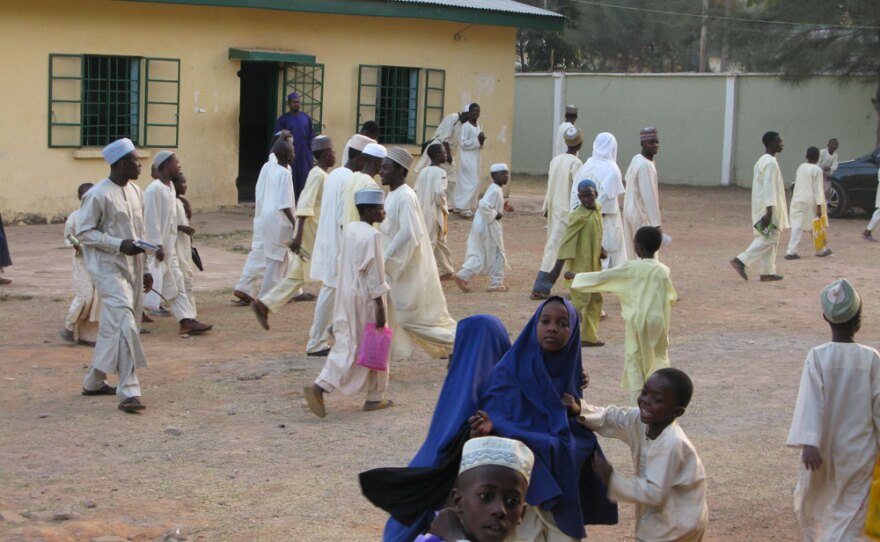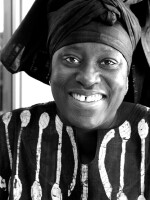Umar Farouk Abdulmutallab stands accused of trying to blow up Northwest Flight 253, from Amsterdam to Detroit, on Christmas Day — with almost 300 people onboard.
While the 23-year-old terrorism suspect lived much of his life outside his native Nigeria, his early years and some vacations were spent in Kaduna, a town in the predominantly Muslim north.
In a school named after his paternal grandparents and funded by his father, Abdulmutallab learned to recite verses from the Muslim holy book, the Quran, from an early age. The Rabiatu Mutallab Institute for Arabic and Islamic Studies is one of hundreds of Quranic schools in Kaduna.
The School
After school on a recent late afternoon, dozens of veiled girls and boys wearing Muslim caps and long traditional gowns studied the Quran, reciting verses out loud.
The bearded imam, Musa Umar Dumawa, is also the institute's director and has known Abdulmutallab since he was an infant. Dumawa condemned the alleged Christmas Day airline bomb plot by his former student.

"I taught him," Dumawa said. "I was his spiritual teacher. I taught him when he was a very little child and he was a very, very respectful boy, very, very obedient child. And I will keep on saying it, what this boy did, I believe he never got the ideas from Nigeria. It's very, very surprising what he's been associated with now."
The imam last saw Abdulmutallab in Kaduna back in August.
"There's no way I could have known if there was anything disturbing him because he's a very, very reserved person," Dumawa said. "He doesn't socialize much. In fact, what he does is when he comes here, he prays. After the prayers, he says hello, hello to people and he walks away. That's why I cannot understand how he got himself into this mess."
The Neighborhood
Umar Farouk Abdulmutallab's family home in Kaduna is a large property with palm trees, milky yellow walls topped with razor wire and a black gate with several guards.
"Farouk is a humble person," said Michael Adah, who lives down the street. "Since I know him I've never in any way seen him behaving arrogantly. It shows the humility in him."
Adah was part of the same neighborhood youth association that Abdulmutallab and his brothers nominally belong to. Adah, 29, said he has always found the 23-year-old Abdulmutallab a gracious, unassuming and devout young man, though a loner.
"I'm not even in his own class," Adah said. "[I'm in] a lower class than him and he gives me that respect. ... Most of the people who are wealthy or even more educated than you, they don't show respect to other-class people."
Looking For Answers
Many in Kaduna are asking how the son of a well-respected banker who was born to privilege and studied abroad could end up facing terrorism-related charges in the U.S. His father alerted various security agencies at home and abroad, as well as the U.S. Embassy in Nigeria, toward the end of last year, about his son's increasingly radical views and his decision to move to Yemen for further studies.
A longtime neighbor of the family, Shehu Sani, a writer, commentator and leading human-rights campaigner, reflected on the current troubles.
He said Nigerians must look for explanations not so much abroad, but right here in their backyard in Kaduna and the Muslim-dominated north, where periodic religious violence has claimed hundreds of lives in the past decade.
"The reality in Nigeria is that there is a rising spread of Islamic fundamentalism — extremist ideas and people that preach hate and violence in abundance here," Sani said. "But we don't have al-Qaida. We also do not have terrorist camps in Nigeria, but there is a reason to be concerned that the atmosphere in the northern part of Nigeria is conducive and vulnerable to violent groups and individuals from the Middle East to have a foothold here."
It is a reality that the country must acknowledge and tackle. Sani said.
Copyright 2022 NPR. To see more, visit https://www.npr.org. 9(MDAzMjM2NDYzMDEyMzc1Njk5NjAxNzY3OQ001))







